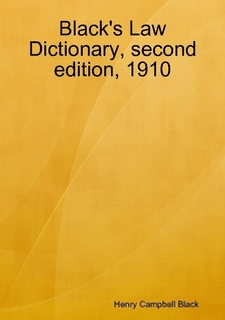Lat Any kind of force, violence or disturbance relating to a man's person or his property.
—Vis ablativa. In the civil law. Ablative force ; force which is exerted in taking away a thing from another. Calvin.
—Vis armata. In the civil and old English law. Armed force ; force exerted by means of arms or weapons.
—Vis claudestina. In old English law. Clandestine force; such as is used by night. Bract, fol. 162.
—Vis compulsiva. In the civil and old English law. Compulsive force ; that which is exerted to compel another to do an act against his will; force exerted by menaces or terror,
—Vis divina. In the civil law. Divine or superhuman force ; the act of God.
—Vis et metus. In Scotch law. Force and fear. Bell.
—Vis expulsiva. In old English law. Expulsive force; force used to expel another, or put him out of his possession. Bracton contrasts it with "vis simplex," and divides it into expulsive force with arms, and expulsive force without arms. Bract, fol. 162.
—Vis extur-bativa. In the civil law. Exturbative force; force used to thrust out another. Force used between two contending claimants of possession, the one endeavoring to thrust out the other. Calvin.
—Vis fluminis. In the civil law. The force of a river; the force exerted by a stream or current; water-power.
—Vis impressa. The original act of force out of which an injury arises, as distinguished from "vis proxima," the proximate force, or immediate cause of the injury. 2 Greenl. Ev. § 224.
— Vis inermis. In old English law. Unarmed force; the opposite of "vis armata." Bract, fol. l62.
—Vis injuriosa. In old English law. Wrongful force; otherwise called "illicita" (unlawful.) Bract fol. 162.
—Vis inquietativa. In the civil law. Disquieting force. Calvin. Bracton defines it to be where one does not permit another to use his possession quietly and in peace. Bract, fol. 162.
—Vis laica. In old English law. Lay force; an armed force used to hold possession of a church. Reg. Orig. 59, 60.
—Vis licita. In old English law. Lawful force. Bract, fol. 162.
—Vis major. A greater or superior force; an irresistible force. This term is much used iu the law of bailments to denote the interposition of violence or coercion proceeding from human agency, (wherein it differs from the "act of God,") but of such a character and strength as to be beyond the powers of resistance or control of those against whom it is directed; for example, the attack of the public quemy or a band of pirates. See The George Shiras, 61 Fed. 300, 9 C. C. A. 511; Brousseau v. The Hudson, 11 La. Ann. 428: Nugent v. Smith, 1 C. P. Div. 437. In the civil law, this term is sometimes used as synonymous with "vis divina," or the act of God. Calvin.
—Vis pertnbativa. In old English law. Force used between parties contending for a possession.
—Vis proxima. Immediate force. See Vis Impressa.
—Vis simplex. In old English law. Simple or mere force. Distinguished by Bracton from "vis armata," and also from "vis expulsiva." Bract, fol. 162.
Definition of Vis
Advertisement
Definitions from Black's Law Dictionary: 2nd Edition and Ballentine's Law Dictionary as are available for each term in each dictionary.
-
Black's Law Dictionary: 2nd Edition
